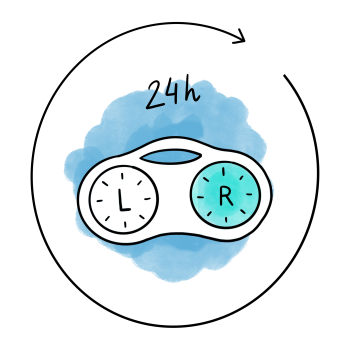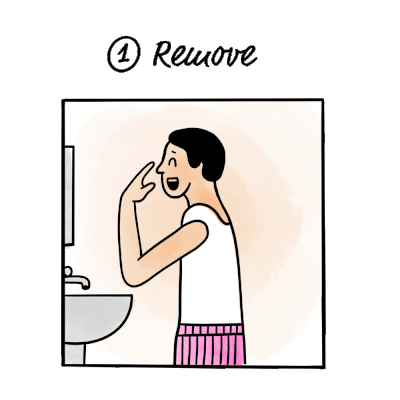Help! I’ve Left My Lenses in All Night!
As the song says, “it’s not unusual”. Forgetting to take out your lenses is a common mistake, although for some people, it’s a conscious decision. That’s the case for wearers whose prescription lenses allow a week or even a month of continuous wear. There are also lenses worn overnight to correct the shape of the cornea. For this group, overnight wear is normal.
But let’s assume you are a daily disposable contact lens wearer, or one of the millions of monthlies wearers who soak their lens in solution each night. You’ve completely forgotten to take out your lens. Maybe a late night out was involved.
Or perhaps an oversight - simply forgetting your normal routine. What are the consequences? The first thing to say is ... don’t panic. Almost likely you won’t have done any lasting damage. The second thing to add is ... prevention is better than cure. Here’s what can go wrong - and how to avoid it in the first place.

HOW NOT TO WEAR LENSES
Research shows that around 30% of people who wear contact lenses have slept whilst wearing their contact lenses . As we say, this is nothing to be over-concerned about, but try not to take the risk.
Sleeping in your contact lenses makes you six to eight times more likely to get an eye infection . If this is minor, it will still be irritating and painful. If it becomes serious, you risk damage to your cornea (the surface of your eye) and potentially your sight.
WHAT HAPPENS?
Your cornea is a world champion at fighting off bacteria from the air. To do so, it needs a constant supply of oxygen - and lubrication. Without lenses, you absorb oxygen easily from the air via your tear film, which works with your eyelids to clean and hydrate your corneas. Wearing lenses when awake allows this to keep happening, though the film of tears under your lens doesn’t flow quite as liberally.
But when you’re asleep, there’s less oxygenating air behind your closed lids. That means your eyes can’t fight bacteria in true superhero fashion. If you or your immune system are under particular stress, a restricted oxygen supply can lead to an inflammation (Keratitis) or an infection, with exotically named bacteria such as Staphylococcus Aureus and Pseudomonas Aeruginosa infecting or ulcerating your cornea. If your eye is cut or scratched, these horrible little beasts leap at the opportunity - and trouble follows.
NOW YOU’RE WORRYING ME!
As we said earlier, there is nothing to worry about, if you mitigate the risks involved by doing a few simple and sensible things. Only wear lenses overnight if they are prescribed as such. Otherwise, remember to take them out each night. Prevention is way better than cure.
If you do fall asleep with contacts in, remove them as soon as you wake up. If one or both lenses have dried out overnight and become ‘glued’ to your eyes, just add some of your multipurpose, sterile contact lens solution or rewetting drops to the affected eye. Blink, then try to take your lenses out in the normal way, before cleaning and disinfecting them.
Leave your lenses in their case or blister pack for at least a full day - and if you feel any discomfort, blurred vision, discharge, redness or excessive watering, visit your optometrist.

THE EXCEPTIONS
The points above relate to lenses prescribed and designed to be worn during the day and taken out at night. As we noted up front however, there are options which can be worn overnight, such as AIR OPTIX® lenses. These are called ‘extended wear’ or ‘continuous wear’ lenses and some are designed to be worn for up to 30 nights and 31 days as recommended by eye care practitioners.
We also mentioned overnight corrective lenses. If you ever hear someone talking about ‘ortho-K’, this is short for ‘orthokeratology’. This is a type of rigid contact lens which reshapes the eye when worn overnight. In other words, it’s the direct opposite to normal daily wear lenses, being worn only when you’re asleep, then taken out when you get up. The corrections made overnight mean you can see more clearly during the day, though this approach only works with a limited range of needs.

BEST PRACTICE
Unless you’re prescribed extended wear or ortho-K lenses, the best advice we can give is to give your corneas a break, while sleeping.
Whenever you need a rest, let your eyes have one too!
References: 1. Centers for Disease Control and Prevention. (2017). "Most adolescent contact lens wearers report habits that could cause eye infection". https://www.cdc.gov/media/releases/2017/p0817-contact-lenses.html
2. Data Behind Contact Lens Wear and Care Recommendations. https://www.cdc.gov/contactlenses/show-me-the-science.html
3. Goodlaw E. Risk of infection from sleeping with contact lenses on: causes of risk. Optom Vis Sci. 1996 Mar;73(3):156-8. doi: 10.1097/00006324-199603000-00005. PMID: 8725015.
4. Why Sleeping in Contacts May Endanger Your Eyes. https://www.healthline.com/health/eye-health/sleeping-with-contacts. Accessed: 10/03/2021
ALWAYS READ THE LABEL AND FOLLOW THE DIRECTIONS FOR USE.
All content on this website is for informational purposes only, always talk to your health professional regarding your eye health or medical conditions.
Never disregard the advice of a medical professional.
